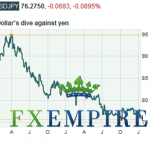The Japanese yen neared its highest level since Japan last intervened in currency markets this past fall.
The USD edging up to ?76.40 from late Monday’s ?76.31.

Yen Intervention on the Horizon… You Heard it Hear
Earlier, the dollar had traded at ?76.70, and Monday’s drop made a test of the 1950?s at ?75.30 possible.
This rise could now open the risk of possible further intervention by the Bank of Japan as the yen continues to rise, with today’s continued rise, it is becoming inevitable, and it is like writing on the wall.
For 2011, the yen was the best performing among major currencies, rising more than 5% against the dollar and 8% against the euro. It’s rallied about 35% against the US dollar since 2007 when the U.S. dollar bought more than ?120. Quite a difference between 76.40 and 120.
Before the financial crisis, Japan’s low interest rates had encouraged a multi-year carry trade of borrowing against the yen to buy higher-yielding assets such as stocks. That has vanished since the Federal Reserve also has dropped US rates and now intends to maintain these rates through 2014.
Earlier this month, the Bank of Japan decided to keep the overnight call rate at around 0% to 0.1%, citing Japan’s “flat” economic activity on weak overseas economies and the yen’s appreciation
overseas economies and the yen’s appreciation
The Bank of Japan also revised its growth forecast for fiscal 2011 to a contraction of 0.3% to 0.4% compared with a previous forecast of 0.2% to 0.4% expansion
Japanese exports have fallen again as demand for the country’s goods continue to suffer.
Overseas shipments fell 4.5% in November from a year earlier, Ministry of Finance data showed.
The strength of the Japanese yen as well as the ongoing European debt crisis has weighed on external demand. Japan’s economy recovered from a recession that was sparked by the devastating tsunami and earthquake in March. And is still in the midst of recovery.
Japanese exports came in at 5.2 trillion yen ($66.8bn; ?42.6bn) in November, falling for the second straight month. While, imports rose 11.4% to 5.88tn yen, the ministry said. Adding to the problems was the effect of the weakness in the global economy.
The other challenge that the global economic uncertainty brings is that investors are turning to the yen as a safer investment. That has boosted the currency making Japanese exports more expensive overseas.
The problem is such a concern that the government will most likely intervene in the currency markets to try and reduce the impact.
Originally posted here



